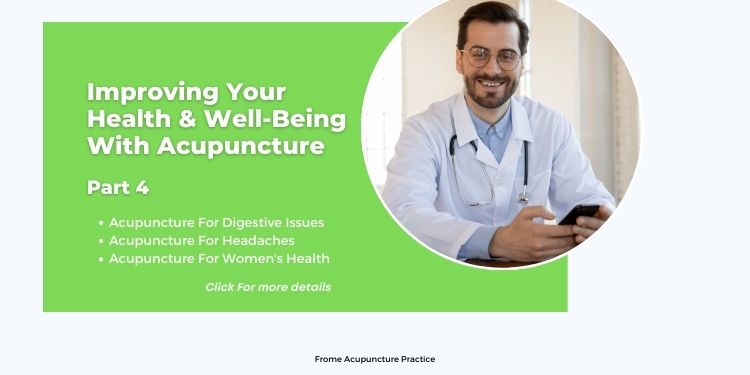Acupuncture for Digestive Problems
Acupuncture is part of the tradition of Chinese medical treatment that has been used to treat a variety of health problems for thousands of years. Digestive problems are one such health ailment that can be effectively treated with acupuncture. In this section, we'll look at the several digestive ailments that can be addressed with acupuncture, how it can assist, and what to expect during an acupuncture session.
Acupuncture Treats Common Digestive Issues
Acupuncture has been shown to help with a variety of digestive disorders, including:
IBS (Irritable Bowel Syndrome)
Irritable bowel syndrome (IBS) is a digestive illness mainly affecting the large intestine. Its symptoms include abdominal pain, bloating, gas, diarrhoea, or constipation. Acupuncture can help relieve IBS symptoms by controlling digestion and lowering inflammation in the stomach.
GERD is the abbreviation for Gastroesophageal Reflux Disease.
GERD is a chronic digestive ailment characterised by the reflux of stomach acid or bile into the oesophagus, leading to symptoms such as regurgitation, heartburn, and chest pain. By modulating the function of the lower oesophagal sphincter and enhancing oesophagal motility, acupuncture can help lessen the frequency and severity of GERD symptoms.
Crohn's Disease
Crohn's disease is a gastrointestinal inflammatory illness that affects the entire digestive tract.
It has symptoms such as stomach pain, diarrhoea, and weight loss. Acupuncture can help reduce inflammation in the intestines and alleviate Crohn's disease symptoms.
Ulcerative Colitis
Another chronic inflammatory bowel illness that affects the colon and rectum is ulcerative colitis. It is distinguished by symptoms such as abdominal pain, bloody diarrhoea, and weight loss. Acupuncture can help lower intestinal inflammation and improve ulcerative colitis symptoms.
Chronic Constipation
Chronic constipation is a common digestive condition characterised by infrequent bowel motions and stool difficulties. Acupuncture can aid in the regulation of bowel motions and the improvement of gastrointestinal motility, hence reducing the symptoms of chronic constipation.
Acupuncture's Role in Digestive Health
Acupuncture works by using small, sterilised needles to stimulate specific acupoints on the body. This stimulation can aid in the regulation of the flow of Qi (pronounced “chee”), the body's essential energy, as well as the promotion of the body's natural healing processes. Acupuncture can help with digestive disorders in the following ways:
Controlling the Digestive System
Acupuncture can assist in controlling the digestive tract by improving the secretion of digestive enzymes and decreasing gut inflammation. This can assist in the relief of symptoms such as abdominal pain, bloating, and diarrhoea.
Stress and Anxiety Reduction
Stress and worry can aggravate digestive problems, including IBS and GERD. Acupuncture helps alleviate stress and anxiety by boosting the production of endorphins, the body's natural painkillers, and decreasing sympathetic nervous system activity.
Boosting Immune Function
Immune dysfunction is frequently related with chronic digestive diseases, including ulcerative colitis and Crohn's disease. Acupuncture can assist in boosting immune function by increasing immune cell production and decreasing gut inflammation.
What to Expect During a Digestive Acupuncture Session
During a digestive acupuncture session, your acupuncturist will first analyse your medical history as well as the specific symptoms you are experiencing. They will then choose appropriate acupoints for your illness and place fine, sterile needles into these points.
A mild tingling or dull soreness may occur at the location of needle insertion, although this should not be uncomfortable.
For thousands of years, acupuncture has been used to treat a wide range of health issues, including digestive disorders. Acupuncture can help improve balance and ease discomfort in the digestive system, which is viewed as an important part of general health in Traditional Chinese Medicine. In this section, we will examine how acupuncture can help people with digestive problems, what disorders can be treated, and what to expect during an acupuncture session.
How Acupuncture Aids Digestive Problems
- Acupuncture works by using thin, sterilised needles to stimulate particular spots on the body. These points correspond to many body parts and systems, including the digestive system. Acupuncture can help regulate the digestive tract and promote healing by targeting these areas.
Acupuncture has been demonstrated in studies to aid with a range of digestive disorders, including:
IBS (irritable bowel syndrome)
Acid indigestion
Ulcers
Diarrhoea
Constipation
Nausea
Crohn's disease
Ulcerative Colitis
Acupuncture can also help with typical digestive issues, including bloating and gas.
What to Expect During a Digestive Acupuncture Session
Your acupuncturist will do a thorough evaluation during your initial acupuncture session for digestive disorders to establish the best course of treatment for your unique situation. To acquire a better picture of your general health, they will most likely ask you questions about your symptoms, nutrition, and lifestyle.
Your acupuncturist may then insert needles into specific body parts such as your abdomen, wrists, and legs. You may feel a minor sensation during the needle insertion, such as tingling or warmth. You will be asked to relax and may even fall asleep during the treatment after the needles are in place.
Depending on the severity of the disease, the number of acupuncture sessions required to notice changes in digestive disorders can vary. Many patients, however, report feeling relieved after only a few sessions.
Alternatives for Digestive Health
Aside from acupuncture, there are various other things you may do to improve your digestive health:
Consume a nutritious diet high in fibre and low in processed foods.
Consume plenty of water.
Engage in stress-reducing activities such as yoga or meditation.
Exercise on a regular basis.
Conclusion
Acupuncture can be a safe and effective approach to treat digestive difficulties ranging from minor pain to more serious conditions like IBS and ulcers. Acupuncture can help reduce symptoms and improve overall digestive health by encouraging bodily balance. If you are having digestive problems, you might think about incorporating acupuncture into your treatment regimen.
Acupuncture for Migraines and Headaches
Headaches and migraines are frequent diseases that afflict millions of people throughout the world. They can be debilitating, impairing a person's ability to do daily tasks and lowering their quality of life. While various traditional treatments for headache and migraine relief exist, more people are turning to acupuncture as a safe and effective therapy.
Understanding Migraines and Headaches
Both headaches and migraines are pains that occur in the head or neck. Conversely, migraines are a type of headache that is distinguished by extreme pain and sensitivity to light and sound, nausea, and vomiting.
Tension headaches, sinus headaches and cluster headaches are all examples of headaches. Tension headaches are the most common type, with mild to moderate discomfort generally described as dull aches. Cluster headaches are less common, although they are distinguished by acute, stabbing pain around one eye. Congestion and pressure around the eyes and cheeks are common symptoms of sinus headaches.
Acupuncture for Migraine and Headache Relief
Acupuncture is an ancient Chinese practice in which small needles are inserted into particular spots on the body. Acupuncture, as descibed by traditional Chinese medicine, works by improving the flow of Qi, or energy, in the body. According to Western medicine, acupuncture may increase the release of endorphins and serotonin, the natural pain-relieving chemicals in the body.
Acupuncture has been demonstrated to help treat migraines and headaches. A meta-analysis of 31 research discovered that acupuncture was superior than standard therapy in reducing chronic headaches' frequency and severity. Another study found that acupuncture was as effective as medicine in lowering migraine frequency.
What to Expect During a Headache or Migraine Acupuncture Session
The acupuncturist will first conduct a complete medical history to detect any underlying issues that may be contributing to your headaches during an acupuncture session for headache or migraine relief. They will then put small needles into specific areas of your body, most commonly the head, neck, and shoulders. You may feel a tiny prick or tingling as the needles are inserted, but it should not be uncomfortable.
The needles will be left in place for 20 to 30 minutes, during which time you will be instructed to relax and breathe deeply. You may feel rested and revitalised when the needles are removed. There may be some moderate discomfort or bruising at the insertion sites, but this should go away fast.
Conclusion
Acupuncture is a safe and effective complementary or alternative therapy for headache and migraine relief. It works by regulating the flow of energy in the body and encouraging the release of pain-relieving substances naturally found in the body. If you are suffering from headaches or migraines, it is critical to consult with your doctor to discover the underlying reason and to consider whether acupuncture may be a viable therapeutic option.
Acupuncture is a complementary therapy, which means it should not be used in place of any conventional medical treatments you are already receiving. Working with your healthcare practitioner to build a comprehensive treatment plan that suits your needs is critical.
Acupuncture Treatment for Women's Health Problems
Many individuals are concerned about and interested in women's health, and acupuncture has proven to be a successful treatment for many common disorders. Acupuncture can help women find comfort and restore balance to their bodies, from monthly pains to menopause symptoms.
Cramps During Menstruation
Menstrual cramps can be debilitating for many women, and over-the-counter pain relievers may not always be effective. Acupuncture has been demonstrated to reduce the severity and length of menstrual cramps. Fine needles are implanted at precise locations on the body during therapy to increase the release of endorphins and improve blood flow, so reducing pain and suffering.
Symptoms of Menopause
Menopause can induce a variety of unpleasant symptoms, such as hot flashes, nocturnal sweats, mood swings, and sleeplessness. Acupuncture can help with these symptoms by balancing the body's hormones and fostering relaxation. Acupuncturists may also propose lifestyle changes, such as dietary changes or stress-reduction tactics, in addition to needle placement, to enhance overall health and wellness throughout menopause.
Infertility
For women who are attempting to conceive, infertility can be a challenging and emotional issue. Acupuncture has been demonstrated to be an effective adjunct therapy for women undergoing fertility procedures such as IVF or IUI. Acupuncture may improve the success rates of various therapies, as well as regulate hormone imbalances and improve ovarian function, according to research.
Pregnancy
Acupuncture can also be helpful during pregnancy, alleviating common symptoms, including morning sickness, back pain, and exhaustion. Furthermore, it may aid in the preparation of the body for labour by increasing blood flow to the uterus and inducing relaxation. However, because specific points should be avoided during pregnancy, it is critical to seek out an acupuncturist who is trained in treating pregnant women.
Conclusion
Acupuncture is a safe and efficient treatment for a wide range of women's health issues, from period cramps to infertility and all in between. Consider trying acupuncture if you are suffering from a female health problem. It may be just what you need to find relief and restore equilibrium to your body with its mild, non-invasive method.
This article is brought to you by: https://goo.gl/maps/fRuMTba3NctaN4iw8
The Article How Acupuncture Can Improve Your Health Part 4 First Appeared ON
: https://ad4sc.com







Comments are closed